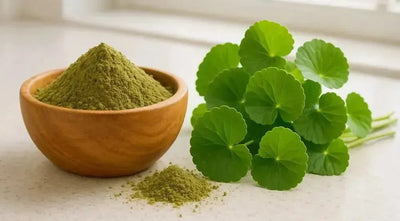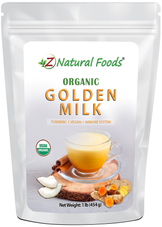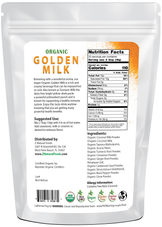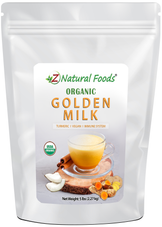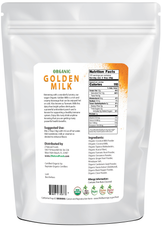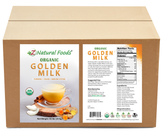Description
Description
While many Western cultures primarily associate milk with chocolate, coffee, or decadent desserts, the concept of "Golden Milk" may seem unfamiliar to most.
However, this unique beverage has a rich history spanning centuries, with various cultures harnessing its potential health benefits.
Despite its recent surge in popularity in the West, Golden Milk has long been valued in traditional medicine systems for its purported ability to enhance overall well-being.
Organic Golden Milk is a great way to elevate your daily glass of milk. This beverage is not just filled with fantastic nutrients and compounds for your health. It is also very aromatic and flavorful. With its roots found in ancient healing practices and traditions, Golden Milk is a beverage that has a cult following today.
What is Golden Milk?
Golden milk is plain milk with a variety of herbs and spices. The milk is then given its unique gold color with the use of turmeric. Typically, golden milk takes a few minutes to prepare. Aside from making sure that you have a rich and creamy milk base, you will need to have the right ingredients as well as the proper proportions to make it taste and smell just right.
Depending on where you source your ingredients, Golden milk can be vegetarian or vegan-friendly, organic, and even gluten-free. Those who are lactose-intolerant may also opt to use coconut milk or other types of plant milk instead of the typical cow's milk to make the beverage. Served either hot or cold, this beverage has come a long way from its origins. It is available in many cafes today and is typically enjoyed in its more sophisticated form, the Golden Latte!
The History of Golden Milk
Golden Milk originated many centuries ago in Ayurvedic medicine and in Indian traditions. In the old times, turmeric was a spice that was not only valued for its flavor and aroma. It was also prized for its potent healing properties. Served not only by healers, it was also given by loving mothers to both children and adults alike to help provide relief to their family's ailments.
Known in India as the "haldi doodh" it was typically made by boiling a cup of milk and dissolving a tablespoon of ground turmeric in it. The resulting piping hot mixture had an exuberant golden color and a distinct flavor and aroma. The pure golden milk mixture could also be sweetened with the use of sugar, made even spicier by the addition of more turmeric, and even made more potent with the use of other herbs and spices.
Centuries ago, people also made their own versions of this drink. Instead of using cow's milk, some of them used tea, almond milk, and even coconut milk to make it. Depending on the availability of ingredients, as well as the desired effect, some healers would also opt to use just plain water and turmeric. Some families were also known to add cashews, butter, and their own blend of spices to make the Golden Milk even richer and creamier.
Do you want to know the secret of the affluent who could make exquisitely rich, flavorful, and aromatic Golden Milk? It's simple, the addition of crushed nuts, honey, cardamom, and saffron made the beverage even more luxurious! So whether you want to enjoy a humble cup of Golden milk, or if you want to make it more decadent and Instagram-worthy with the addition of spices and even foam, you are taking part in a centuries-old tradition of wellness and health.
What does Golden Milk Taste like?
The taste of Golden Milk will typically depend on its ingredients as well as its proportions. As the star of the beverage, turmeric is known to have a citrus aroma that is akin to ginger and oranges. On its own, turmeric’s flavor can be quite intense and bitter with a pungent aftertaste. This is why adding too much turmeric in your golden milk can make it taste very strong. The addition of too much black pepper or cardamom can also make your beverage taste too spicy, sharp, and unpalatable.
A great-tasting Golden Milk beverage should have the proper balance of spices, and it should still retain the rich creaminess of the milk. This is why those who have not tried Golden Milk before, should try to add the powder little by little to their milk until it meets their taste preferences.
What are the Benefits of Drinking Golden Milk?
Traditionally, Golden Milk has been used for generations to help promote sleep as well as to help provide relief from various ailments. The use of turmeric has been widely recognized by scientific studies as beneficial when it comes to health, and the beverage is even more fortified with the addition of other spices such as ginger, cinnamon, black pepper and cardamom. Some of the health benefits of Golden Milk includes:
1) Golden milk may be used to help fight inflammation
Turmeric is known to contain a potent medicinal compound known as curcumin. Aside from helping to give turmeric its vibrant orange color, curcumin has been known to have potent anti-inflammatory properties.
Aside from being connected to injury and trauma, studies have shown that inflammation is associated with major diseases. Low-level inflammation is known to occur with heart disease, cancer, as well as with neurodegenerative conditions. According to scientific studies, curcumin can easily match the effectiveness of conventional anti-inflammatory drugs without causing any side-effects. (1)
2) The combination of black pepper and turmeric in Golden Milk may increase its medicinal properties
As an active ingredient in turmeric, curcumin may provide antioxidant benefits and support a healthy inflammatory response. However, because curcumin is poorly absorbed through the bloodstream, it requires the help of another substance known as piperine, one of the active ingredients found in black pepper. Studies have shown that when combined with pipirine, curcumin is better absorbed by the body, and its effectiveness is significantly increased. (2)
3) Golden milk may help provide you with antioxidants and may help increase your body's antioxidant activity
Studies have shown that the curcumin found in turmeric can act as an antioxidant with the help of its unique molecular structure. This means that it can help your body fight against free radicals, and it may also help you avoid oxidative stress. Curcumin is also known to boost and activate the other antioxidants that are already in your body. In effect, it creates a multi-pronged attack against free radicals. (3) (4)
4) Golden Milk may help provide you with anti-mutagenic benefits
According to scientific studies, curcumin may be beneficial when used in combination with mainstream cancer therapies. Scientists have suggested that with the help of this protocol, tumors were less likely to develop new blood vessels. Curcumin was also found to help destroy mutated cells and stop their spread and progression. (5)
5) Golden Milk may help you avoid brain diseases
The formation of neurons and new connections in your brain has been linked to a brain hormone known as brain-derived neurotrophic factor or BDNF. Decreased levels of this hormone have been linked with memory problems and Alzheimer's disease. Studies have shown that curcumin may help to increase your body's BDNF hormones. This has led many scientists to believe that curcumin may be beneficial when it comes to slowing down brain diseases. (6)
Curcumin has also been proven to be able to cross the blood-brain barrier. This means that it may have the potential to provide your brain with many health benefits. Curcumin has also been proven to help clear amyloid plaques that may be related to Alzheimer's disease. This property may hold the key to its potential when it comes to slowing the progression of neurodegenerative diseases. (7)
6) Golden Milk may help you avoid age-related diseases
Because curcumin supports a healthy inflammatory response and has powerful antioxidant properties, scientists now have reason to believe that curcumin may be a great supplement that will help promote longevity. Medical professionals are now starting to see its potential as an effective anti-aging supplement because it has proven to be effective in fighting against certain conditions related to aging. (8)
7) Golden milk with cinnamon and ginger powder may help improve heart health
Curcuminoids found in turmeric have been known to help reduce heart attacks even with patients who have gone through heart surgeries. The addition of ingredients such as cinnamon and ginger to your Golden Milk may also help to make it more potent when it comes to protecting yourself from heart disease since these can also help improve your cholesterol and HDL levels. (9)
8) Golden Milk may help improve your immune system
For centuries golden milk has been given by mothers to children who are sick. And today, scientific studies have proven that curcumin contains properties that can fight against microorganisms such as viruses and bacteria. This is why Golden Milk was considered very effective for generations when it comes to providing support as your body fights against illnesses. With the addition of cinnamon and ginger powder, this beverage may also be an excellent home remedy for colds and flu. (10)
9) Golden Milk may help improve mood and provide relaxation
Aside from being a beverage that has been used to help promote sleep, curcumin has been proven by studies to help reduce depression. In a study conducted using 60 participants, it has been found out that curcumin may help improve mood. It may also help improve the symptoms of people suffering from a depressive disorder. What's more, curcumin has also been proven to boost the effectiveness of antidepressant drugs, making it an ideal supplement for those who are suffering from this problem. (11)
10) Golden Milk may help lower blood sugar
With the addition of cinnamon and ginger powder, your golden milk may help reduce blood sugar. Cinnamon has a long history of being used to support healthy blood sugar levels and studies conducted in 2017 have shown that ginger may help people who are suffering from type 2 diabetes by lowering their fasting blood sugar. (12)
Organic Golden Milk
Organic Golden Milk is an amazing healthy beverage that can be enjoyed by both children and adults alike. With its rich taste, vibrant color, and pleasant aroma, this beverage is an excellent alternative to milk, coffee, or tea. With the help of the right ingredients, it can be very easy for the whole family to enjoy golden milk as a delicious treat before bedtime and even during family gatherings. You can elevate golden milk into Golden lattes, and you can even make it more decadent and luxurious by the addition of crushed nuts, honey, and also other aromatic and beneficial spices.
Golden milk can be used daily as a hot or cold drink. Aside from helping to improve your mood and promote relaxation, it may help improve the quality of sleep because it does not contain caffeine. Golden milk can also help you by providing your body with antioxidants and anti-inflammatory agents that may help protect your body from developing degenerative diseases.
The curcumin found in turmeric has been known to fight against microbes, and it has also been proven to promote heart and brain health. By allowing your body to get enough curcumin through the daily intake of Golden milk, your body may be able to function correctly and to have the protection that it needs against certain illnesses. Golden Milk is a delicious way to keep you and your family strong and healthy.
If you are looking for a Golden Milk powder that is Vegan, Organic, and full of nutrients, you can try Z Natural Foods’ Organic Golden Milk here.
References
- Jurenka JS. Anti-inflammatory properties of curcumin, a major constituent of Curcuma longa: a review of preclinical and clinical research. Alternative medicine review : a journal of clinical therapeutic. 2009;14(2):141-153. https://www.ncbi.nlm.nih.gov/pubmed/19594223. Accessed May 6, 2020.
- Shoba G, Joy D, Joseph T, Majeed M, Rajendran R, Srinivas PS. Influence of piperine on the pharmacokinetics of curcumin in animals and human volunteers. Planta medica. 1998;64(4):353-356. doi:10.1055/s-2006-957450
- Biswas SK, McClure D, Jimenez LA, Megson IL, Rahman I. Curcumin induces glutathione biosynthesis and inhibits NF-kappaB activation and interleukin-8 release in alveolar epithelial cells: mechanism of free radical scavenging activity. Antioxidants & redox signaling. 2005;7(1-2):32-41. doi:10.1089/ars.2005.7.32
- Menon VP, Sudheer AR. Antioxidant and anti-inflammatory properties of curcumin. Advances in experimental medicine and biology. 2007;595:105-125. doi:10.1007/978-0-387-46401-5_3
- Aggarwal BB, Kumar A, Bharti AC. Anti-cancer potential of curcumin: preclinical and clinical studies. Anti-cancer research. 2003;23(1A):363-398. https://www.ncbi.nlm.nih.gov/pubmed/12680238. Accessed May 6, 2020.
- Dong S, Zeng Q, Mitchell ES, et al. Curcumin Enhances Neurogenesis and Cognition in Aged Rats: Implications for Transcriptional Interactions Related to Growth and Synaptic Plasticity. Chapouthier G, ed. PLoS ONE. 2012;7(2):e31211. doi:10.1371/journal.pone.0031211
- Zhang L, Fiala M, Cashman J, et al. Curcuminoids enhance amyloid-beta uptake by macrophages of Alzheimer's disease patients. Journal of Alzheimer's disease : JAD. 2006;10(1):1-7. doi:10.3233/jad-2006-10101
- Sikora E, Bielak-Zmijewska A, Mosieniak G, Piwocka K. The promise of slow down ageing may come from curcumin. Current pharmaceutical design. 2010;16(7):884-892. doi:10.2174/138161210790883507
- Wongcharoen W, Jai-Aue S, Phrommintikul A, et al. Effects of curcuminoids on frequency of acute myocardial infarction after coronary artery bypass grafting. The American journal of cardiology. 2012;110(1):40-44. doi:10.1016/j.amjcard.2012.02.043
- Moghadamtousi SZ, Kadir HA, Hassandarvish P, Tajik H, Abubakar S, Zandi K. A review on antibacterial, antiviral, and antifungal activity of curcumin. BioMed research international. 2014;2014:186864. doi:10.1155/2014/186864
- Sanmukhani J, Satodia V, Trivedi J, et al. Efficacy and safety of curcumin in major depressive disorder: a randomized controlled trial. Phytotherapy research : PTR. 2014;28(4):579-585. doi:10.1002/ptr.5025
- Khandouzi N, Shidfar F, Rajab A, Rahideh T, Hosseini P, Mir Taheri M. The effects of ginger on fasting blood sugar, hemoglobin a1c, apolipoprotein B, apolipoprotein a-I and malondialdehyde in type 2 diabetic patients. Iranian journal of pharmaceutical research : IJPR. 2015;14(1):131-140. https://www.ncbi.nlm.nih.gov/pmc/articles/PMC4277626/. Accessed May 6, 2020.


